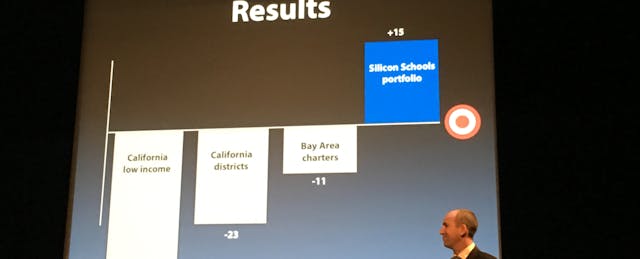Promises--delivered. That was the theme of the Wednesday evening reception for more than 200 people at San Francisco’s Museum of Modern Art, aimed at celebrating the work of Bay area schools delivering personalized learning programs, funded by the Silicon Schools Fund.
Back in 2012, educator Brian Greenberg and philanthropist John Fisher, started the nonprofit with $12 million, and a big goal of funding 25 schools devoted to personalized learning throughout the San Francisco Bay area.
So far, so good. At the MOMA gathering, Greenberg mapped out what they have accomplished: Silicon Schools has funded 24 new schools and seven existing ones on both sides of the San Francisco Bay. Together those schools serve 10,000 students. All are exploring different versions of personalized learning. And--even though Greenberg and his team were quick to say that grades aren’t everything, the schools seem to be winning some sweet scores: Silicon Schools Fund schools beat the “target” assessment goal set by the state of California. Other groups, notably including Bay Area charters and low-income families, fell short.
Dave Levin, who found KIPP, was on hand to ask a few pointed questions: “What do you want your children to get out of school?” he queried. “Happiness!” shouted back several. “And what do you think of when you think of school?” he asked. “Calculus!” retorted one. “Discipline” shouted another. “So that means that the education system is functioning exactly the opposite of what we think is positive?” Levin asked.
Twenty years ago, KIPP got right when it made a promise to students, he said. “We promised a group of kids that we would be there for them. Forever,” Levin said. “What does it mean for us to think of these promises to children as sacred? It means you treat other people’s children as if they are your own.”
David Kelley, founder of IDEO and Susie Wise, director of the K12 Lab Network, talked about the power of empathy. "It feels good--in our bodies--to be creative," Kelley said. "It changes who students are." Anne Williams-Isom, chief executive of the Harlem Children’s Zone, a 97-block in Harlem in New York City, and offered thoughtful guidance around the challenge of loving all students, everywhere.
The evening's panels also including Todd Rose, a Harvard professor and author of "The End of Average," and Diane Tavenner, founder of Summit Public Schools. They described how personalizing science is changing medicine--and how it will also change education. "We have to be prepared to iterate," Tavenner said.
Next up for Silicon Schools? Forty personal learning schools, Greenberg pledged, all aimed at delivering great education to all students.


